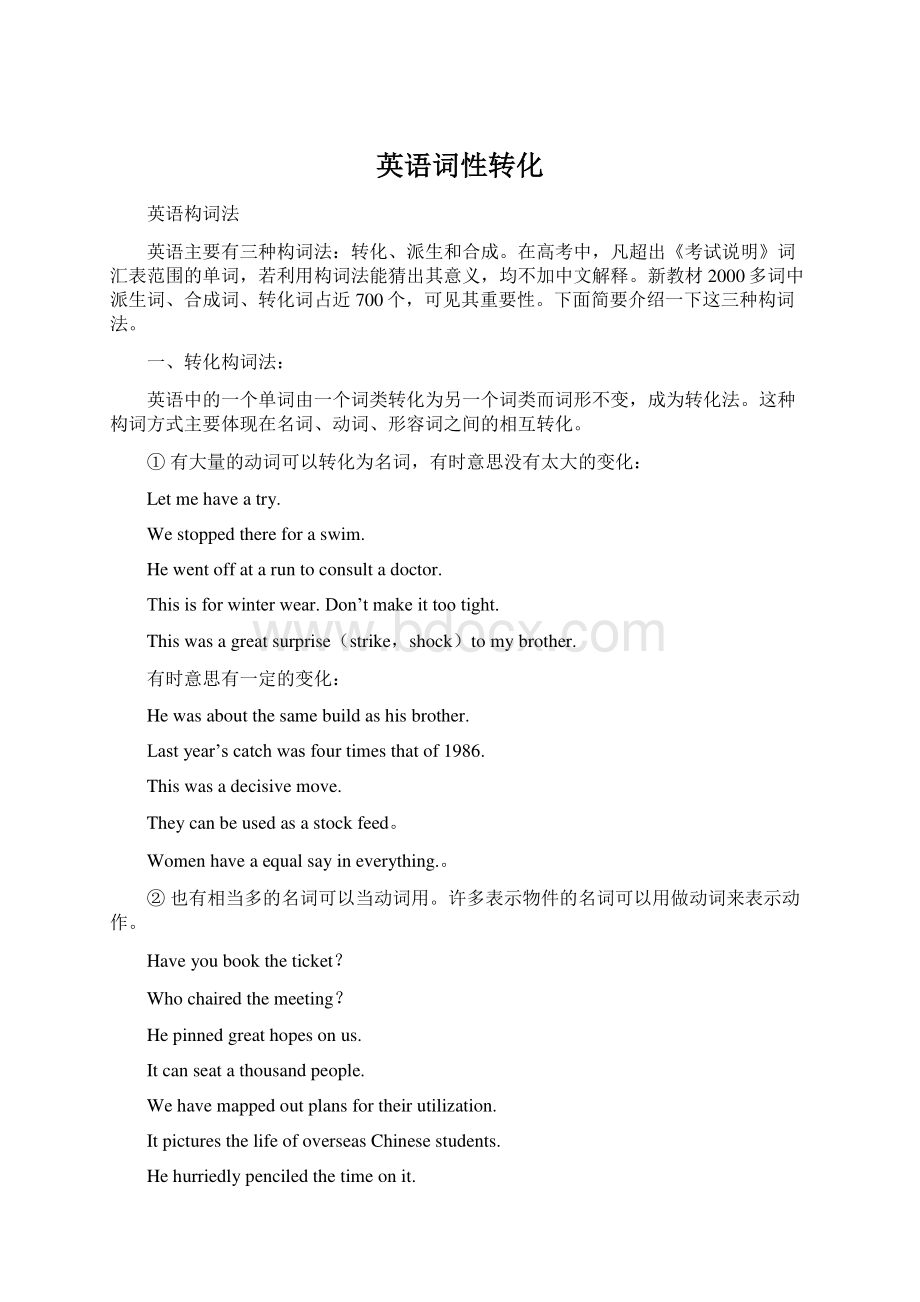英语词性转化文档格式.docx
《英语词性转化文档格式.docx》由会员分享,可在线阅读,更多相关《英语词性转化文档格式.docx(10页珍藏版)》请在冰豆网上搜索。

许多表示物件的名词可以用做动词来表示动作。
Haveyoubooktheticket?
Whochairedthemeeting?
Hepinnedgreathopesonus.Itcanseatathousandpeople.Wehavemappedoutplansfortheirutilization.ItpicturesthelifeofoverseasChinesestudents.Hehurriedlypenciledthetimeonit.Bynoonhehadbaggedthreehares.Themachinebottles15000jarsofcoldaday.Themoneywasallpocketedbycorruptofficials.Hehammeredanailintothewall.有些表示身体部位的名词也可以用来做动词。
Handinyouexercise-books,please.Wellnotbackup.Weshoulddaretofaceanydifficultyanddanger.Whoheadedthedelegation.WellheadedforYunnantomorrow.Weshouldshouldertheseresponsibilities.Shefingeredthesilkgently.Imneverinterestedinnosingoutthedetailsofsomeoneelsesprivatelife.Theyeyedhimwithsuspicion.一些表示一类人的名词也可用做动词:
Ifso,weshallbebadlyfooled.)Heinsistedonstayinguptonursethechild.)Wewerehostedbymembersoftheembassy.Ouraimistosavethepatientandnottodoctorhimtodeath.Theequipmentwasmannedbythreeworkerspershift.HehassoldieredinFranceinhisyouth.Thearmywasofficeredbybravemen.Heclaimstohavefatheredover20children.Hefatheredmanyinventions.一些表示其他实物的名词也可用做动词:
Eachapartmentcanhouseafamilyofsix.Ihopewecanroomtogether.Thishelpedtobridgeoverourdifficulties.Theyfloweredwellbutborelittlefruit.Heflooredtheroom.Anaeroplanewasusedtodustinsecticide.Wedecidedtodamtheriver.Heisbusyoilingthebicycle.Hewolfeddownthreegreatbowlsofrice.Thepilliscoatedwithsugar.Executives,workersandtechniciansteamup.此外,还有一些抽象名词等也可以用做动词:
Wheredoswallowswinter?
WesummeredbyLakeGeneva.Forsixdaysandnightstheybattledtosavehislife.Throughmychildhood,Ihadhungeredforeducation.Thissoangeredusthatwebeathimup.Theybreakfasted(lunched)attheguesthouse.Over1000studentsstormedintotheSenatebuilding.有不少形容词也可以用做动词:
Thetrainsloweddowntohalfitsspeed.Thisisthechiefwayofnarrowingthedifferencesbetweenthem.Pleasewarmupthedishoverthestove.Theroomgraduallyquieteddown.形容词转化为名词HernativelanguageisGerman.Youcanalwaystellthedifferencebetweentouristsandnatives.Dontwashwhitesandcoloredstogether.Thewhitesofhereyewerebloodshot.Imonlytellingyouthisforyourowngood.Whatsthegoodofearningallthatmoneyifyoudonthavetimetoenjoyit.Itwilldoyougoodtoyourhealth.情态动词转化为名词Hisnewnovelisamustforallloversofsciencefiction.Idontwanttogoagainstyourwill.Itsgodswill.Wherethereisawill,thereisaway.Thereisnoneedforyoutogetupearlytomorrow.Weshouldmeetchildrensspecialeducationalneeds.代词转化为名词Shethinksshesreallysomebodyinatcar.Sherosefrombeinganobodytobecomeasuperstar.二、派生在一个单词的前、后面加上词缀构成新词的方式就为派生。
加在前面的叫前缀(prefixes),加在后面的叫后缀(suffixes)。
前缀一般不改变词类,而主要决定一个词的词义;
后缀一般不改变词义,而主要决定一个词的词类。
(一)前缀1.表示否定意义的常见前缀形式un-构成反义词,表示否定或相反的动作,经常附在动词、形容词、副词之前。
unusual,uncertain,unwanted,unable,unfair,uncover,unnecessary,unhappy,unimportant,unknown,unpleasant,untouched,unlike,unexpectedly,undress,unfold,unlock,undo,Iundidthepackageandtookoutthebooks.Sheundressedandgotintobed.Everyonehelpedtounloadtheluggagefromthecar.Thedivershopedtounlockthesecretoftheseabed.dis-构成反义词,表示“不”,经常附在动词、形容词、副词之前。
例:
discomfort,disappear,dishonest,discover,disagree,dissatisfied,disappointed,dislike,disobey,disadvantage,disagree,discourage,disable,disallow,disapproval,disbelieve,disconnect,disharmony,Youcouldbedisqualifiedfromdrivingforupto3yearsbecauseofdrivingafterdrinking.Everythingwasinadisorderedstate.Youhavedishonoredthenameoftheschool.Herbehaviorhasbroughtdisgraceonherfamily.Shedisclaimedanyknowledgeofherhusbandswhereabouts.Mostoftherebels(叛乱分子)werecaughtanddisarmed.in-/im-构成反义词,表示“不”,im用于以m,b,p等开头的词;
其余都用in-如:
impossible,impolite,imperfect,improper,immodest,impatient,imbalanceinactive,inadequate,incorrect,incomplete,indirect,independence,informal,ingratitude,inhuman,injustice,inoperative,insincere,intolerable,invisible,ir-构成反义词,表示“不”,用于以r开头的单词例:
Irregular,irresponsible,irresistible,irrelevant,irreligiousil-构成反义词,表示“不”,用于以l开头的单词例:
illegalmis-构成反义词,表示“错误”、坏例:
mistake,misuse,misunderstand,Anychildcaughtmisbehavingwasmadetostandatthefrontoftheclass.Thenewspapersmisreportedthefactsofthecase.IafraidIcompletelymisreadthesituation.Shenowrealizesshemisjudgedhim.non-构成反义词,表示“不”,常在名词,形容词及作形容词用的分词前例:
non-stop,non-smoker,nonsense,nonviolence,nonalcoholic,nonessential,nonrenewable,non-existed,nonscientificanti-表示反抗、阻止、排斥anti-Japanese,anti-freezing,antisocial,antibiotic,antibody,2.表示其他意义的前缀re-表示“再;
又;
重”,re-多重读,构成双重读词。
rewrite,repay,remarry,rewrite,reread,react,retell,rebuild,reusea-表示“的”,多构成表语形容词。
例alone,alike,aside,asleep,awake,alive,ahead,afraid,aloud,tele-表示“远程的”,电话的,电视的。
telephone,television,telegram,telecommunication,telesales,teleworking,telescope,telecontrol,en-表示“使”,构成动词。
enlarge,enable,enrich,ensure,enforce,endanger,encourage,enjoy,inter-表示“关系”。
internet,international,interviewpre-表示在前,事先,预先Prewar,preview,predictfore-表示位置在前,时间提前,预先Forehead,forecast,foresee,foretell,forearmsub-表示在下面,低于subway,subwater,submarine,subcommittee,subconscious,subnormal,auto-表示自身、自己、自动autoboat,autobus,automatic,autograph,autoimmune,autobiographybi-表示双的bicycle,bilingual,biannualtri-表示三个tricycle,triangle,trilogycon(在b,m,p前用com;
在r前用cor;
在元音字母前或h前用co)connect,conquer,consider,constant,contain,continue,command,common,compare,company,correct,cooperate,cohabit,cohenrentkilokilometer,kilogramme,kilowatte,kiloherzeuni意为“单一”uniform,union,united,unify,unique,unisextrans-意为“变化;
转移;
通过;
跨越”translate,transplant,transport,transfer,transform,transmit,transatlantic
(二)后缀后缀通常改变词性,构成意思相近的其它词性的词;
少数后缀同时会改变词义。
A.形容词性后缀:
1.-al例:
nationnational民族的,国家的;
naturenatural自然的2.-able表示“有能力的”例:
eateatable能吃的3.-an/ian表示“国家的,国家人的”。
AmericaAmerican美国(人)的4.-ern表示“方向的”。
easteastern东方的,southsouthern南方的5.-ful例:
beautybeautiful美丽的,carecareful小心的6.-less表示否定例:
carecareless粗心的,useuseless无用的7.-ic/ical例:
electricityelectric/electrical电的8.-ese表示“人的”。
ChinaChinese中国(人)的9.-ly例:
friendfriendly友好的,yearyearly每年的10.-y表示“天气”等。
cloudcloudy多云的,dustdusty多尘的11.-ous例:
famous著名的,continuous连续不断的12.-ish例:
childish孩子气的,selfish自私的13.-en例:
golden金色的,wooden木制的,woolen羊毛的14.-ive例:
active积极的,collective集体的B.动词后缀:
1.-fy例:
beautybeautify美化2.-en例:
widewiden加宽,sharpsharpen削,looseloosen使松散C.副词后缀1.-ly例:
badbadly坏地,easyeasily容易地2.-ward表示“方向”。
backward向后,eastward向东D.名词后缀:
1.-ment例:
agreeagreement协议,movemovement运动2.-ness例:
happyhappiness幸福,busybusiness事务3.-tion例:
explainexplanation解释,dictatedictation听写4。
-er表示“人”。
workworker工人,buybuyer买主5.-or表示“人”。
actactor演员,sailsailor海员6.-ist表示“人”。
pianopianist钢琴家,sciencescientist科学家7.-ess表示“人或动物”,指阴性。
actress女演员,lioness母狮子8.-ful表示“量”。
mouthful一口,handful一把9.-th例:
truetruth真理,longlength长度E.数词后缀1.-teen构成“十几”。
fivefifteen十五2.-ty构成“几十”。
nineninty九十,fivefifty五十3.-th构成序数词。
fivefifth第五,sixsixth第六1、合成法将两个或两个以上的单词合成在一起而构成的新词,叫做合成词。
(1)合成形容词名词+现在分词例:
English-speaking讲英语的,south-facing朝南的名词+过去分词例:
man-made人造的,water-covered被水覆盖的名词+形容词例:
snow-white雪白的,day-long整天的形容词+名词+-ed例:
warm-hearted热情的,kind-hearted好心肠的形容词/副词+现在分词例:
good-looking好看的funny-looking滑稽的副词+过去分词例:
well-known出名的,deep-set(眼睛)深陷的副词/形容词+名词例:
right-hand右手的,full-time专职的数词+名词例:
100-meter100米的,million-pound百万英镑的数词+名词+形容词例:
180-foot-high180英寸高的,10-year-old10岁的数词+名词+-ed例:
four-footed/legged四脚的,one-eyed独眼龙的
(2)合成名词名词+名词例:
weekend周末,classroom教室,bookshop书店形容词/介词+名词例:
gentleman绅士,loudspeaker扬声器动词+名词例:
typewriter打字机,cookbook烹调书名词+动词例:
daybreak破晓,toothpick牙签动词-ing形式+名词例:
reading-room阅览室,sleeping-car卧车车厢副词+动词例:
outbreak爆发,downpour倾盆大雨名词+动名词例:
handwriting笔迹,sun-bathing日光浴名词+in/to0+名词例:
mother-in-law岳母,brother-in-law姐夫(3)合成动词副词+动词例:
overthrow推翻,understand理解形容词+动词例:
broadcast广播,whitewash粉刷名词+动词例:
typewrite打字,sleepwalk梦游(4)合成副词介词+名词例:
underfoot脚下,beforehand事先形容词+名词例:
hotfoot匆忙地,someday有朝一日形容词+副词例:
anywhere任何地方,outwards向外(5)合成介词:
within在之内,without没有,inside在里边,into进入(6)合成代词:
myself我自己,ourselves我们自己,anyone任何人,nobody没有人nothing没东西,somebody有人。
2、派生法所谓派生,即在词根上加前缀或后缀构成另一个与原意略有变化或截然相反的词。
(1)前缀前缀通常只改变词义,不改变词性。
3、转化法英语单词的词性非常活跃,名词用作动词,动词转化为名词,形容词用作动词等现象非常普遍,这种把一种词性用作另一种词性的方式就叫做词性的转化。
阅读中经常出现转化词,只要抓住单词的原始意思,结合句子成分,就容易弄清它们的引申义。
下面就将一些常见的变化列举如下:
(1)动词转化为名词A.有大量动词可以转化为名词,有时意思没变化。
Letmehaveatry.让我试一试。
Westoppedthereforaswim.我们在那停下来游了一会儿泳。
B.有时意思有一定的变化。
Hewasaboutthesamebuildashisbrother.他的体形和他哥哥差不多。
Womenhaveanequalsayineverything.妇女在各个方面都有同等的发言权。
(2)名词转化为动词A.有相当多的名词可以用作动词,特别是许多表示物体的名词用作动词来表示动作Haveyoubookedyourticket?
你的票订好了吗?
Itcanseat1000people.它能容纳1000人。
B.一些表示身体某部位的名词也可以作为动词Handinyourbook,please.请把书交上来。
Wewillbackyouup.我们将做你的后盾。
C.一些表示某类人的名词也可做动词Ifso,weshallbebadlyfooled.如果这样我们就会上大当。
Heinsistedonstayinguptonursethechild.他坚持不睡觉来护理这个孩子。
D.一些表示其它实物的名词也可用作动词Eachapartmentcanhouseafamilyofsix.每套房间可以住一户六口人的人家。
Theyfloweredwellbutborelittlefruit.它们花开得很好,但结果不多。
E.此外,还有一些抽象名词可以用作动词Throughmychildhood,Ihadhungeredforeducation.我从小就盼望上学。
Theylunchedatthehotel.他们在宾馆吃了午饭。
(3)形容词转化为动词有少数形容词也可以用作动词。
Thetrainsloweddowntohalfitsspeed.火车速度减慢了一半。
Thiswillhelpwarmupthe